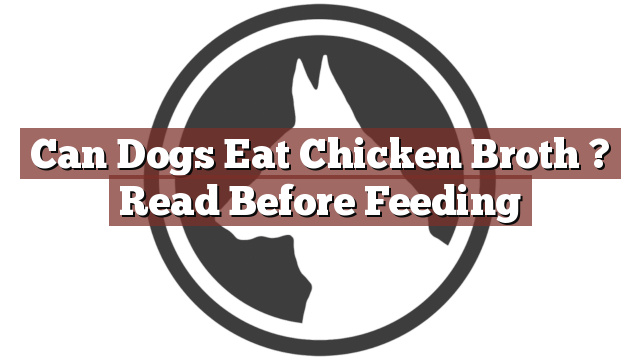Understanding Your Dog’s Dietary Needs
As responsible pet owners, it is crucial to understand our dogs’ dietary needs to ensure their overall health and well-being. While dogs primarily thrive on a diet consisting of meat, their nutritional requirements can vary depending on their breed, age, size, and any specific health conditions they may have. It is essential to provide a balanced diet that meets their protein, carbohydrate, fat, vitamin, and mineral needs.
Can Dogs Eat Chicken Broth? Read Before Feeding
Can dogs eat chicken broth? This is a common question that dog owners often ask. The answer is yes, dogs can safely consume chicken broth in moderation. Chicken broth is a flavorful and nutritious liquid that can be used to enhance the taste and texture of their meals. It is typically made by simmering chicken bones, meat, and vegetables in water, resulting in a rich and savory broth.
Pros and Cons of Feeding Chicken Broth to Your Dog
Before incorporating chicken broth into your dog’s diet, it is important to consider the pros and cons.
Pros:
- Improved hydration: Chicken broth can be a valuable source of hydration, especially for dogs who are reluctant to drink water.
- Enhanced flavor: For picky eaters, adding chicken broth to their food can entice them to eat and improve their appetite.
- Nutritional benefits: Chicken broth contains essential nutrients, minerals, and proteins that can contribute to your dog’s overall health.
Cons:
- Sodium content: Store-bought chicken broths often contain high levels of sodium, which can be detrimental to your dog’s health if consumed excessively. It is important to opt for low-sodium or homemade chicken broth.
- Allergies and intolerances: Some dogs may be allergic or sensitive to chicken or the specific ingredients used in the broth. It is crucial to monitor your dog for any adverse reactions after consuming chicken broth.
Conclusion: Considerations for Feeding Chicken Broth to Your Dog
In conclusion, dogs can enjoy the benefits of chicken broth when fed in moderation. However, it is essential to consider a few important factors. First, always choose low-sodium or homemade chicken broth to avoid unnecessary sodium intake. Additionally, observe your dog for any allergic reactions or gastro-intestinal issues that may arise after consuming chicken broth. If you have any concerns or if your dog has any specific dietary restrictions, it is advised to consult with your veterinarian before incorporating chicken broth into their diet.
Understanding our dogs’ dietary needs and making informed decisions about their food choices is crucial for their well-being. By providing a balanced and appropriate diet, including occasional treats like chicken broth, we can ensure that our furry friends lead healthy and happy lives.
Thank you for taking the time to read through our exploration of [page_title]. As every dog lover knows, our furry friends have unique dietary needs and responses, often varying from one canine to another. This is why it's paramount to approach any changes in their diet with caution and knowledge.
Before introducing any new treats or making alterations to your dog's diet based on our insights, it's crucial to consult with a veterinarian about [page_title]. Their expertise ensures that the choices you make are well-suited to your particular pet's health and well-being.
Even seemingly harmless foods can sometimes lead to allergic reactions or digestive issues, which is why monitoring your dog after introducing any new food item is essential.
The content provided here on [page_title] is crafted with care, thorough research, and a genuine love for dogs. Nevertheless, it serves as a general guideline and should not be considered a substitute for professional veterinary advice.
Always prioritize the expert insights of your veterinarian, and remember that the health and happiness of your furry companion come first.
May your journey with your pet continue to be filled with joy, love, and safe culinary adventures. Happy reading, and even happier snacking for your canine friend!

